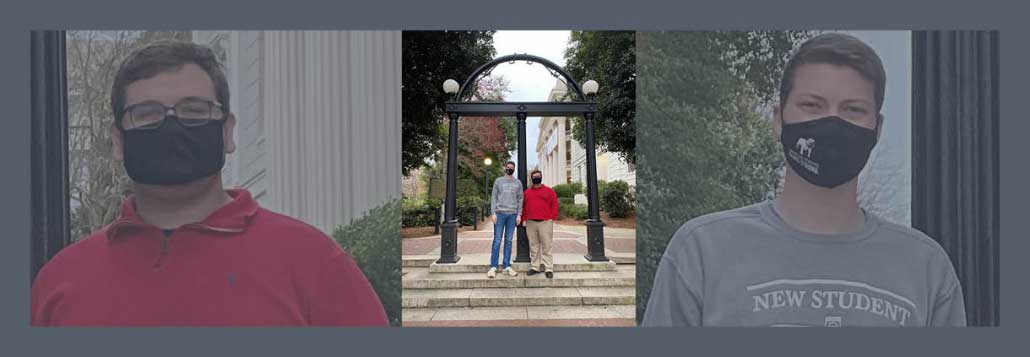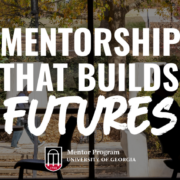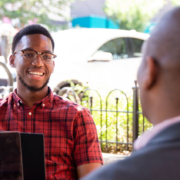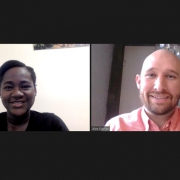The mentoring relationship from both sides
Hunter Smith (AB ’18 ) mentors Bryson Henriott (Class of 2023). Here, they share their perspectives about the mentoring relationship in their own words.
The Mentor (Hunter Smith [AB ’18])
The cinematic legend Steven Spielberg once said, “The delicate balance of mentoring someone is not creating them in your own image, but giving them the opportunity to create themselves.” When you step back, the role of a mentor is more akin to that of a producer or director — they help the writer, the mentee, to see their goal through; to advance their vision. When I was first contacted to serve as a mentor, I felt woefully unprepared to fulfill the role. What benefit could I, a young professional having only graduated two-and-a-half years earlier, really provide a student only a few years my junior? Since graduating, I had not seen the realities of the “real-world” which would have warranted me to give sage advice on the best career and life moves. Instead, I had spent my time in law school and currently was juggling my own fears concerning life and career moves. In my mind, I was not yet an individual worth emulating; I was not yet a mentor.
Upon reflection, though, I realized mentorship is not a demonstration of excellence to be emulated, but is instead a journey towards one’s truest potential—both for the mentee and the mentor. When I thought back to my mentors in college, I realized that the importance of my experience was not in their title or who they were, but instead in how they made me feel, the opportunities they gave me, and in who they allowed me to be. A good mentor provides mentees a chance to develop themselves by acting as a sounding board and guiding light. Mentorship is not a map, but a compass. My best mentors in life, have been with me every step of the way, not telling me what to do or where to go, but have given me a refuge to run to when times get tough, stability in times of uncertainty, and a light when things seem dark.
By stripping the idea of mentorship as the pinnacle of excellence, I have also come to understand that mentorship can have lasting effects for the mentee as well as the mentor. Though the few ages difference between my mentee and me worried me at first, I have since come to understand this as a benefit. Though he is my mentee, he is also my friend; I see myself in him and when I give him advice or answer his questions, I feel as though I am talking to my younger self. In helping him navigate this time in his life, I also feel compelled to reflect on my own journey and those who helped me and may also be able to provide mentorship to him. My mentee challenges me to see the world from new perspectives, reminds me of where I have come from, and challenges me to reach new heights. Mentorship is a pursuit of self-development and, as such, it is a recursive and reiterative lifelong process. What good is knowledge and experience without someone to share that wisdom with? And the sooner we do so, the better the world. Even as I provide mentorship to others, I look to my own mentors for guidance in my life. Mentorship is a crucial relationship in life—whether you are old or young, you have value as a mentor because you can advise and counsel others and provide them an opportunity to create themselves. Each day I strive to be like the visionaries that came before me and light the way for the generation that will follow.
The Mentee (Bryson Henriott, Class of ’23)
As a rural first-generation college student, the process of thinking about graduate school, choosing between internships, and deciding on a career overwhelmed me. There was a moment during freshman year when it hit me that although I made it to college, I had no idea how to navigate the steps during and after college. I was interested in law school, but did not have anyone that I could talk to about the LSAT, applications, how law school realistically is, and how to make such an important decision when you have uncertainties.
I knew the best way to tackle these issues would be to find a mentor who had gone through the same decisions. The UGA Mentor Program is an incredible platform that allows students to connect with alumni who have the same passions and the experience to help you answer the questions you do not know. I remember looking through the available mentors, and Hunter immediately stuck out. We both came from rural Georgia to UGA; he graduated with the same degree I am pursuing, and took part in several organizations that I was involved in. Hunter and I both have a passion for the intersection of law and politics, and I knew he would be able to provide meaningful advice. The fact that he was in law school was helpful, and he has been able to deliver authentic answers to my law school questions.
Although our mentorship is relatively new, it is been an incredible experience. Hunter has reviewed my resume, advised me on internships, and shared about his personal journey behind attending law school. There was no awkward transition period once we matched, and we quickly began sharing our journeys and stories. A mentor is not there to have an answer to every question, but rather is a guidebook to share their journey and advice. There is a comfort in knowing that whenever I am facing a decision in my college career, I have someone in my corner one call away. I cannot recommend the UGA Mentor Program strongly enough; it is an incredible way to connect with professionals who can share a vast amount of knowledge and who want to see you succeed. It has shown me what a mentor is supposed to do and has prepared me to (hopefully) be a mentor after graduation so I can give back to a program that has given me so much.






 UGA DARCOMM
UGA DARCOMM


